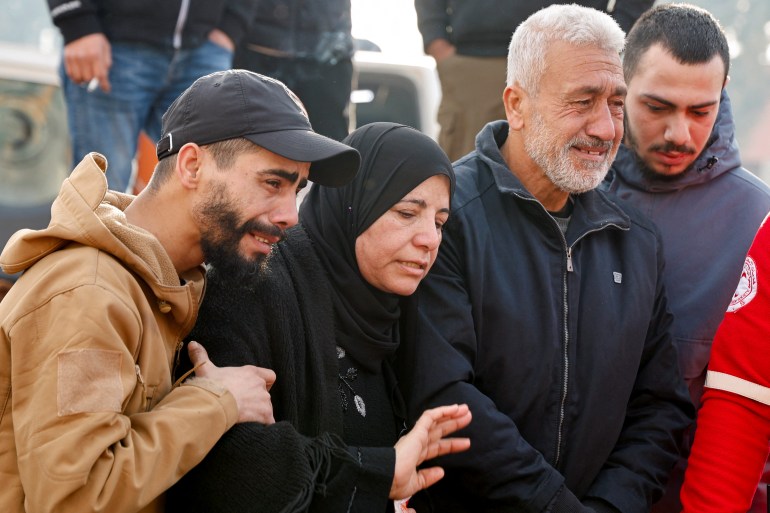Jenin, occupied West Bank, Palestine – For nearly two weeks, 11 bodies lay in the morgues of Jenin as Israeli raids ravaged the city and its refugee camp.
Their families were too frightened to bury them in Jenin because of Israeli snipers, drones and artillery.
“Families are afraid to bury their loved ones in the camp cemetery because Israeli snipers are stationed on high buildings,” Mahmoud al-Saadi, director of emergency services in Jenin, said on Monday. “Some bodies have been in the morgue for over 13 days. We need Israeli clearance just to conduct a burial, and even that has been delayed multiple times.”
Honouring the dead
In the time since Israel launched its latest raid on Jenin on January 21, many people have died. At least 30 have been killed by Israeli soldiers while others have died of natural causes.
They lingered, unburied, as their families struggled to lay them to rest.
For 55-year-old Bassam Turkman, who lives in the refugee camp, the sudden death of his 60-year-old brother, Osama, was an “insurmountable loss” deepened by the torment of being unable to give him a proper burial.
Driven from their home, the Turkman family sought refuge in Burqin, a town west of Jenin. But their fragile sense of stability collapsed once again with the eldest brother’s sudden deterioration and death.
For days, Osama’s body lay in the cold limbo of a hospital morgue as the family pondered whether to bury him in Burqin’s unfamiliar soil or cling to the faint chance of returning him to the cemetery in the camp to rest beside the home they were forced to flee.
Bassam pleaded with his family to choose Burqin.
“We grew up believing that honouring the dead meant burying them quickly,” he told Al Jazeera. “Leaving him in the morgue indefinitely just didn’t feel right, especially since the hospital was already overwhelmed with the bodies of those killed during the operation.”
The raid on Jenin comes during a spike in Israeli violence in the West Bank since a fragile ceasefire halted Israel’s 15-month assault on Gaza, which has killed close to 62,000 Palestinians and left the enclave in ruins.
The operation has driven nearly all of Jenin refugee camp’s 20,000 people from their homes, according to the United Nations.
“We are a people who need to visit our dead, to sit by their graves, talk to them and remember,” Bassam said. “Burying our loved ones far from home is a pain in itself.”
But in the end, Osama was laid to rest in Burqin, about 4km (2.5 miles) from Jenin. As Israeli bulldozers tore through the camp’s infrastructure, Bassam and his family stood by the side of Osama’s grave.
Standing beside the Turkmans to perform funeral prayers were members of the al-Khateeb family. They were bidding farewell to 59-year-old Marwan al-Khateeb, who died on the first day of the raids and was buried near Osama in Burqin’s cemetery.
“The occupation shows no respect for the living or the dead. To them, we’re all terrorists,” Bassam lamented.
‘Martyrs’ without proper farewells
On January 28, Israeli forces shot 25-year-old Osama Abu al-Hayja as he stood on the roof of a building. He bled to death as gunfire kept his family and an ambulance from being able to reach him until the next day.
His family was also barred from holding a traditional funeral.
“We wanted to lay Osama to rest alongside the other martyrs,” his older brother, Tareq Abu al-Hayja, said. “But the soldiers sealed the camp. They even blocked roads to keep people from gathering.”
In Jenin, public processions for those killed by Israeli forces have long served as a communal act of both mourning and defiance. Hundreds of people typically gather to accompany the dead to burial sites with families travelling from across the West Bank to join the sombre ceremonies to honour individuals many here regard as “martyrs.”
The Abu al-Hayja family could not bear the thought of leaving Osama unburied for days, but its members knew they would never be able to give him the farewell a “martyr” deserved.
So they chose to bury Osama in the nearby village of Martyrs’ Triangle, ensuring a dignified farewell despite the circumstances.
“The decision wasn’t easy,” Tareq said, “but we wanted him to have a proper burial, even if it meant doing it far from home.”
On Saturday, after 13 days of violence in the camp, the Palestinian liaison office finally was able to coordinate with its Israeli counterpart to allow funerals for the people whose bodies lay in the morgues.
The Israeli authorities imposed strict conditions: no processions, no public gatherings, only ambulances quietly transporting the dead to the cemetery, each accompanied by just two family members.
Mourners had barely begun preparing for the mass burial when the Israeli military rescinded the coordination, citing “security concerns”.
The delays forced Mahmoud of the emergency services and his team to improvise, burying four people in the eastern district of Jenin, which was less affected by the raid, but the burials of seven others were postponed again.
By Monday, Israeli forces finally permitted the burials of the seven remaining people.
But the mourning processions have been reshaped by Israeli military restrictions: no throngs of mourners, no slogans.
“We’ve always honoured our martyrs together,” one mourner said, declining to give his name for fear of reprisals.
“Now, we bury them in silence.”
This article is published in collaboration with Egab.
